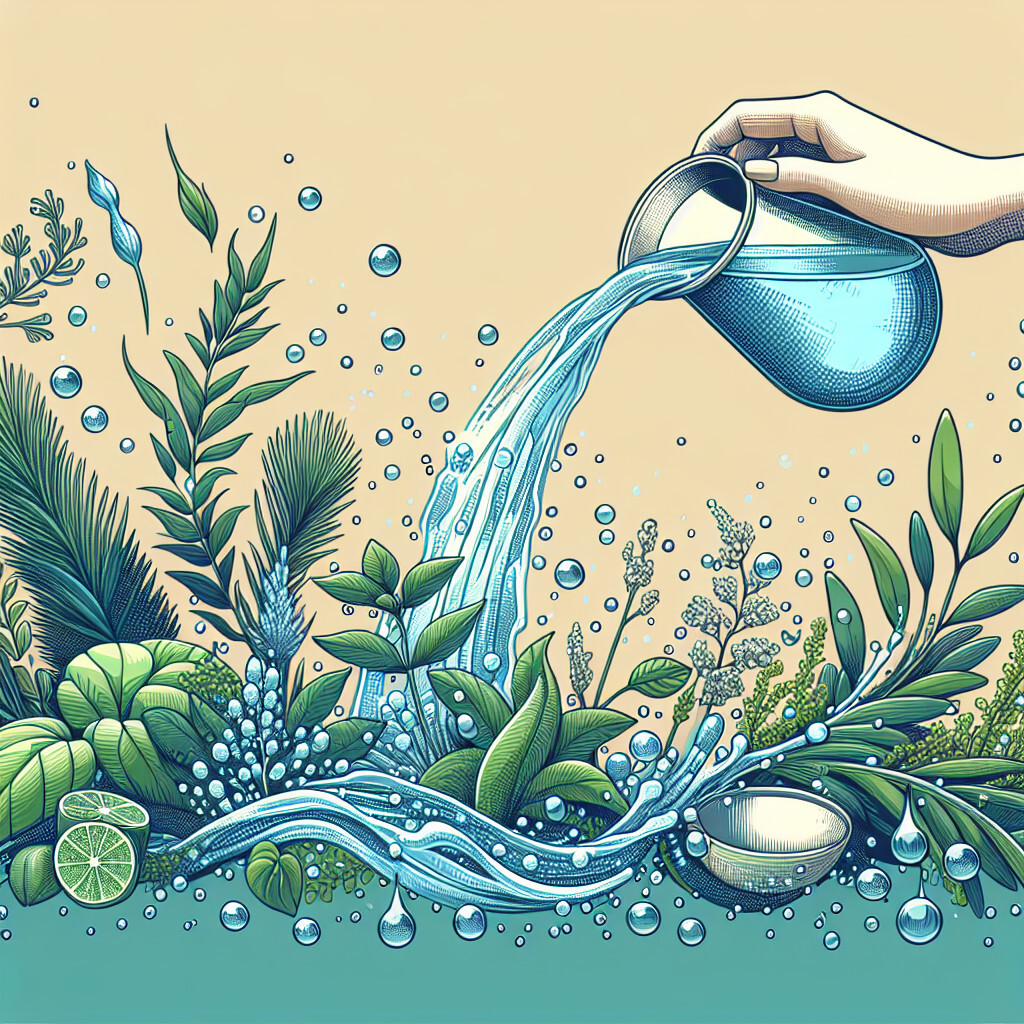-
Table of Contents
“Quenching Thirst, Nourishing Nature: Mineral Water for Plants”
Introduction

Mineral water on plants refers to the practice of using mineral-rich water for plant irrigation. This water, often bottled, contains essential minerals like calcium, magnesium, and potassium that can contribute to plant growth and health. The use of mineral water can be particularly beneficial in areas where the soil is deficient in these vital nutrients. However, the impact of mineral water on plants can vary depending on the type of plant and its specific nutritional needs.
The Impact of Mineral Water on Plant Growth
Mineral water, a common household item, is often overlooked for its potential benefits in the realm of plant growth. This water, rich in essential minerals such as calcium, magnesium, and potassium, can significantly impact the health and development of plants. The use of mineral water on plants is a topic that has been gaining attention in recent years, with numerous studies highlighting its potential benefits and implications.
The primary advantage of using mineral water for plants lies in its rich mineral content. These minerals are essential for plant growth and development. For instance, calcium plays a crucial role in the formation of plant cell walls, thereby contributing to the overall structural integrity of the plant. Magnesium, on the other hand, is a vital component of chlorophyll, the pigment responsible for photosynthesis. Without adequate magnesium, plants cannot effectively convert sunlight into energy. Potassium is another essential mineral that aids in various plant functions, including water regulation and the activation of enzymes.
The use of mineral water can be particularly beneficial in areas where the soil is deficient in these essential minerals. By watering plants with mineral water, gardeners can supplement these deficiencies and promote healthier, more robust plant growth. This is especially true for indoor plants, which often lack access to the wide range of nutrients available in outdoor soil.
However, it’s important to note that while mineral water can be beneficial, it should not be used as a complete substitute for regular watering and fertilization practices. Plants require a balanced diet, and while mineral water can provide certain nutrients, it may not supply all the necessary elements needed for optimal growth. Therefore, it should be used as a supplement to a comprehensive plant care routine.
Moreover, the impact of mineral water on plant growth can vary depending on the type of plant and its specific nutritional needs. Some plants may thrive with the additional minerals, while others may not require as much. For example, plants that prefer acidic soil, such as azaleas and blueberries, may not respond as well to mineral water due to its typically higher pH level. Therefore, it’s essential for gardeners to understand the specific needs of their plants before introducing mineral water into their care routine.
Another factor to consider is the potential for mineral buildup in the soil. Over time, the repeated use of mineral water can lead to an accumulation of minerals in the soil, which can potentially harm plants. This is particularly true for salts, which can build up in the soil and cause damage to plant roots. To prevent this, gardeners should monitor their soil regularly and consider alternating between mineral water and regular water.
In conclusion, while mineral water can provide plants with essential nutrients and potentially enhance their growth, it should be used judiciously and as part of a balanced plant care routine. Understanding the specific needs of your plants and the composition of your soil can help you make the most of this resource. With careful use, mineral water can be a valuable tool in promoting healthy, vibrant plant growth.
Understanding the Role of Mineral Water in Plant Nutrition
Mineral water, a common household item, is often overlooked for its potential benefits in the realm of plant nutrition. This article aims to shed light on the role of mineral water in plant nutrition, providing a comprehensive understanding of its significance.
Mineral water is a type of water that contains various minerals such as calcium, magnesium, potassium, and sodium. These minerals are not only essential for human health but also play a crucial role in plant nutrition. Plants, like humans, require a balanced diet of nutrients to grow and thrive. These nutrients are typically absorbed from the soil through the plant’s root system. However, in some cases, the soil may not provide all the necessary nutrients, or the plant may struggle to absorb them. This is where mineral water can play a pivotal role.
The minerals found in mineral water can supplement the nutrients that plants receive from the soil, thereby enhancing their growth and development. For instance, calcium, a mineral commonly found in mineral water, is vital for plant cell wall development. It strengthens the plant’s structure and aids in stress tolerance. Similarly, magnesium plays a significant role in photosynthesis, the process by which plants convert sunlight into energy. Without adequate magnesium, plants may exhibit yellowing leaves, a common sign of nutrient deficiency.
Moreover, potassium, another mineral present in mineral water, is essential for the overall health and vigor of plants. It aids in protein synthesis, improves water use efficiency, and enhances resistance to diseases and pests. Sodium, although required in smaller amounts, contributes to the osmotic processes in plants, helping them maintain water balance.
However, while mineral water can be beneficial for plants, it is essential to use it judiciously. Excessive minerals can lead to a condition known as nutrient toxicity, which can harm the plant. Therefore, it is advisable to use mineral water as a supplement to regular watering rather than a replacement. It is also worth noting that not all plants have the same nutrient requirements. Some plants may thrive with additional minerals, while others may not. Hence, understanding the specific nutrient needs of your plants is crucial.
Furthermore, the quality of mineral water can vary significantly. Some brands may contain higher levels of certain minerals, while others may have additional elements like sulfur or iron. Therefore, it is essential to read the label and understand the mineral content before using it on your plants.
In conclusion, mineral water can play a significant role in plant nutrition. It can supplement the nutrients that plants receive from the soil, thereby enhancing their growth and development. However, it is essential to use it judiciously and understand the specific nutrient needs of your plants. With the right balance, mineral water can be a valuable tool in your gardening toolkit, helping your plants thrive and flourish.
Mineral Water vs Tap Water: Which is Better for Your Plants?
Mineral water, often consumed for its purported health benefits, is a topic of interest among gardening enthusiasts. The question often arises: is mineral water better for plants than tap water? To answer this, it is essential to understand the composition of both types of water and their effects on plant growth.
Mineral water is sourced from underground reservoirs and mineral springs. It contains various minerals like calcium, magnesium, potassium, and sodium, along with trace elements like iron, zinc, and copper. These minerals are naturally occurring and are essential for human health. But do they offer the same benefits to plants?
On the other hand, tap water’s composition varies significantly depending on the source and treatment process. It may contain chlorine, fluoride, and other chemicals used to kill bacteria and other microorganisms. While these substances make the water safe for human consumption, they can be harmful to plants, especially when used in large quantities over time.
The minerals found in mineral water are indeed beneficial for plants. They play a crucial role in plant nutrition, contributing to various physiological processes. For instance, calcium is vital for cell wall development, while magnesium is a critical component of chlorophyll, the pigment responsible for photosynthesis. Potassium regulates the opening and closing of stomata, tiny pores on plant leaves that control water loss and gas exchange.
However, it’s important to note that most soils already contain these essential minerals. Using mineral water can supplement these nutrients, but it’s unlikely to have a significant impact on plant health if the soil is already well-balanced. Over-reliance on mineral water could even lead to an excess of certain minerals, which can be detrimental to plant growth.
In contrast, the chemicals in tap water can be harmful to plants. Chlorine, in particular, can cause damage to plant tissues and impede growth. However, this is usually only a concern with high levels of chlorine. Most tap water contains chlorine at levels safe for plants, and it can even evaporate if the water is left standing for a few hours.
Fluoride, another common component of tap water, can also be problematic for certain types of plants. Some species, like peace lilies and spider plants, are particularly sensitive to fluoride and may develop leaf tip burn as a result. However, like chlorine, the fluoride levels in most tap water are generally safe for most plants.
So, is mineral water better for your plants than tap water? The answer is, it depends. If your tap water is heavily chlorinated or fluoridated, or if your soil is deficient in certain minerals, mineral water might be beneficial. However, for most indoor and outdoor plants, tap water is perfectly adequate.
In conclusion, while mineral water can provide some benefits to plants, it’s not necessarily superior to tap water. The best approach is to understand the specific needs of your plants and the quality of your tap water. Regular soil tests can also help ensure your plants are getting the nutrients they need. Whether you choose to use mineral water, tap water, or a combination of both, the key is to water wisely and appropriately for the specific needs of your plants.
Exploring the Benefits of Using Mineral Water for Indoor Plants
Mineral water, a common household item, is often overlooked as a beneficial resource for indoor plants. This water, rich in essential minerals, can significantly contribute to the health and growth of indoor plants. The use of mineral water for indoor plants is a practice that is gaining popularity among plant enthusiasts and horticulturists alike, due to the numerous benefits it offers.
Mineral water is water from a mineral spring that contains various minerals, such as salts and sulfur compounds. These minerals are not only beneficial for human health but also for plants. The minerals found in this type of water can provide plants with essential nutrients that they may not receive from tap water or rainwater. For instance, calcium and magnesium, which are commonly found in mineral water, are vital for plant growth. They aid in the development of plant cell walls and play a crucial role in photosynthesis and enzyme activity.
The use of mineral water for indoor plants can be particularly beneficial in areas where the tap water is hard or contains high levels of chlorine. Hard water can lead to the accumulation of salts in the soil, which can inhibit plant growth. On the other hand, chlorine can be harmful to plants, causing leaf burn and stunted growth. Mineral water, being free from these harmful substances, can be a safer alternative for watering indoor plants.
Moreover, mineral water can help improve the soil structure. The minerals in the water can bind with the soil particles, leading to better soil aggregation. This can enhance the soil’s ability to retain water and nutrients, thereby promoting healthier plant growth. Additionally, the improved soil structure can facilitate better root penetration, allowing the plants to access more nutrients and water.
However, while mineral water can be beneficial for indoor plants, it is important to use it judiciously. Excessive use of mineral water can lead to an accumulation of minerals in the soil, which can be detrimental to plant health. It is recommended to alternate between mineral water and distilled or rainwater to prevent mineral buildup in the soil.
Furthermore, it is essential to note that different plants have different nutrient requirements. Some plants may thrive with the additional minerals provided by mineral water, while others may not. Therefore, it is advisable to research the specific nutrient needs of your indoor plants before deciding to use mineral water.
In conclusion, mineral water can be a valuable resource for indoor plants, providing them with essential nutrients and improving soil structure. However, it should be used wisely and in moderation, taking into consideration the specific needs of each plant. With the right balance, the use of mineral water can contribute to the growth and vitality of indoor plants, making them a more vibrant and healthier addition to your indoor environment.
Q&A
1. Question: Does mineral water benefit plants?
Answer: Yes, mineral water can benefit plants as it contains essential minerals like calcium and magnesium that plants need for growth.
2. Question: Can mineral water harm plants?
Answer: If used excessively, mineral water can harm plants due to the high salt content which can build up in the soil and affect the plant’s ability to absorb water.
3. Question: Is mineral water better than tap water for plants?
Answer: It depends on the quality of your tap water. If your tap water is heavily chlorinated or contains other harmful chemicals, mineral water might be a better option.
4. Question: Can all plants be watered with mineral water?
Answer: Not all plants will benefit from mineral water. Some plants, especially those adapted to specific environments, may not tolerate the minerals in the water well. It’s best to research the specific needs of your plants.
Conclusion
In conclusion, mineral water can be beneficial for plant growth due to the presence of essential minerals. However, the effects can vary depending on the type and concentration of minerals in the water. Overuse of mineral water can potentially harm the plants due to the accumulation of certain minerals. Therefore, it’s advisable to use it in moderation and monitor the plant’s response.






